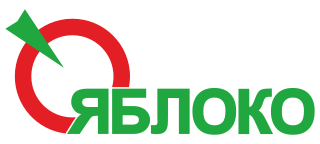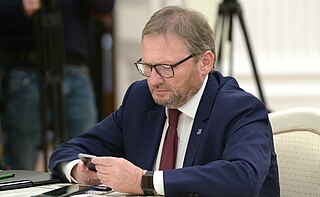
United Russia is the ruling political party of the Russian Federation. United Russia is the largest party in Russia and as of 2018 it holds 335 of the 450 seats in the State Duma.

The Russian United Democratic Party "Yabloko" is a Russian social-liberal political party founded by former Soviet Deputy Prime Minister Grigory Yavlinsky and currently led by Representative Emilia Slabunova. The party's logo consists of a red circle and a green isosceles triangle, suggesting an apple in a constructivist style, a nod to the party's acronym which is a Russian word for "apple". Yabloko’s party platform stands for a social market economy, fair competition in politics and the economy, is for the inviolability of private property, and for equal opportunity. On a federal level, the party is represented by one senator, Vladimir Lukin.

The Constitutional Democratic Party, also called Constitutional Democrats and formally the Party of People's Freedom, was a liberal political party in the Russian Empire encompassing constitutional monarchists and moderate republicans. Party members were called Kadets from the abbreviation K-D of the party name. Konstantin Kavelin's and Boris Chicherin's writings formed the theoretical basis of the party's platform. Historian Pavel Miliukov was the party's leader throughout its existence.

The Union of Right Forces political party, or SPS, is a Russia political public organization and former party, initially founded as an electoral bloc in 1999 and associated with free market reforms, privatization, and the legacy of the "young reformers" of the 1990s: Anatoly Chubais, Boris Nemtsov, and Yegor Gaidar. The party was officially self-dissolved in 2008. Nikita Belykh was the party's last leader in 2005-2008.
Liberal conservatism is a political ideology combining conservative policies with liberal stances, especially on economic, social and ethical issues, or a brand of political conservatism strongly influenced by liberalism.
Within Russian political parties, liberal parties advocate the expansion of political and civil freedoms and mostly oppose Vladimir Putin. In Russia, the term "liberal" can refer to wide range of politicians –( for reference check NCERT class 9 chapter socialism and Russian revolution )simultaneously to Thatcherism/Reaganomics-related pro-capitalism conservative politicians, to centre-right liberal politicians and to left-liberal politicians. The term "liberal democrats" is often used for members of the far-right nationalist part, the Liberal Democratic Party of Russia. There are Russian opposition and pro-government liberal political parties in Russia. Pro-government liberal politicians support Putin's liberal policy in economics.
This article gives information on liberalism worldwide. It is an overview of parties that adhere to some form of liberalism and is therefore a list of liberal parties around the world.

National Bolshevik Front (NBF) has been used as a name for three separate strands of National Bolshevism. The name initially applied to the Russian National Bolshevik Party (NBP) of Eduard Limonov when it was founded in 1993. The group soon changed its name as it emerged as a political party.
The Democratic Choice of Russia was a Russian centre-right conservative-liberal political party. From 1993 — 1994 it was called "The Choice of Russia". Later the party was self-disbanded and most members would merge into the Union of Right Forces.
Civilian Power is a liberal political party in the Russian Federation. The organization was called the Network Party for Support of the Small and Middle Business in 2002, then renamed Free Russia in 2004, and in February 2007 changed to Civilian Power.
Party of Growth (Russian: Партия Роста; Partiya Rosta is a political party in Russia with representatives in several local legislatures. Founded on 18 February 2009 as a merger of the Union of Rightist Forces, Civilian Power and the Democratic Party of Russia, the party's main policy stances are liberal free market economy, democracy and protecting the rights of the middle class. Although widely regarded as a pro-Kremlin party, it has already found itself in opposition to the presidential administration on several occasions.

Solidarnost is a Russian liberal democratic political movement founded on 13 December 2008 by a number of well-known members of the liberal democratic opposition, including Garry Kasparov, Boris Nemtsov and others from the Yabloko and Union of Right Forces parties, leaders of the Dissenters March events, the Committee 2008, the People's Democratic Union, the United Civil Front, The Other Russia and other politicians and political groups.
Democratic Russia was the generic name for several political entities that played a transformative role in Russia's transition from Communist rule.
Russian Assembly was a Russian loyalist right-wing monarchist political group (party). It was founded in Saint Petersburg in October−November 1900, and dismissed in 1917. It was led by Prince Dmitry Golitsyn. It opposed liberal western parliamentarianism, and advocated 'the old formula of Autocracy, Orthodoxy and Nationality'.

Pravda is a Russian broadsheet newspaper, formerly the official newspaper of the Communist Party of the Soviet Union, when it was one of the most influential papers in the country with a circulation of 11 million. The newspaper began publication on 5 May 1912 in the Russian Empire, but was already extant abroad in January 1911. It emerged as a leading newspaper of the Soviet Union after the October Revolution. The newspaper was an organ of the Central Committee of the CPSU between 1912 and 1991.

The Moscow legislative election of 2009 was held October 11 of that year to the Moscow City Duma. On party lists were elected 18 of the 35 deputies, 17 deputies were in single-member constituencies. To get into the City Duma parties need to overcome the 7% threshold. The term of office of the new City Duma is five years. It had been four years.

Boris Yurievich Titov is a Russian politician, businessman, and Presidential Commissioner for Entrepreneurs’ Rights. He has led the Party of Growth previously known as "Just Cause" since February 2016. Titov represented his party in the 2018 Russian presidential election.











